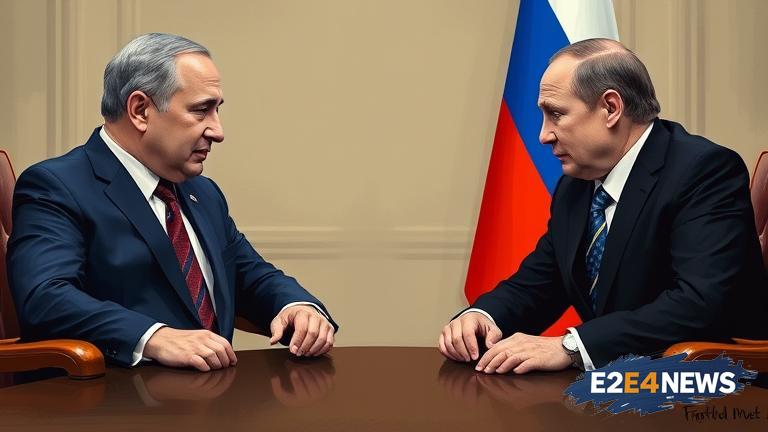The recent talks between Israeli Prime Minister Benjamin Netanyahu and Russian President Vladimir Putin have been shrouded in mystery, leaving many to speculate about the motivations behind the diplomatic efforts. According to sources, the discussions centered around a range of critical issues, including the ongoing conflict in Syria, the Iranian nuclear program, and the growing tensions between Israel and Russia. Netanyahu’s decision to meet with Putin was reportedly driven by a desire to address the escalating tensions between the two nations, which have been fueled by Russia’s increasing involvement in the Syrian civil war. The Israeli leader is said to have expressed concerns about the potential consequences of Russia’s actions in the region, including the risk of accidental clashes between Israeli and Russian forces. Putin, on the other hand, is believed to have used the talks as an opportunity to reaffirm Russia’s commitment to its strategic interests in the Middle East, including its support for the Syrian government. The two leaders also discussed the issue of Iranian military presence in Syria, with Netanyahu reportedly urging Putin to use his influence to curb Iran’s activities in the region. Despite the challenges, the talks are seen as a positive development, with many hoping that they will pave the way for improved relations between Israel and Russia. The diplomatic efforts come at a time of heightened tensions in the region, with Israel and Iran engaging in a series of tit-for-tat exchanges in recent months. The Israeli military has been actively targeting Iranian forces in Syria, prompting retaliatory strikes from Tehran. The situation has been further complicated by the involvement of other regional players, including Turkey and the United States. As the situation continues to unfold, many are watching with bated breath, wondering what the future holds for the region. The talks between Netanyahu and Putin are seen as a crucial step towards reducing tensions and preventing a wider conflict. However, the road ahead is likely to be fraught with challenges, and it remains to be seen whether the two leaders will be able to find common ground. The international community is eagerly awaiting the outcome of the talks, with many hoping that they will mark a turning point in the region’s troubled history. The diplomatic efforts are also being closely watched by other regional players, including the Palestinians, who are seeking to advance their own interests in the region. As the situation continues to evolve, one thing is clear: the talks between Netanyahu and Putin have the potential to shape the future of the Middle East, and their outcome will be closely watched by governments and observers around the world. The region is holding its breath, waiting to see what the future holds. The talks have sparked a flurry of diplomatic activity, with other regional players seeking to capitalize on the momentum generated by the Netanyahu-Putin discussions. The United States, in particular, is seen as a key player in the region, and its response to the talks will be closely watched. The European Union is also seeking to play a role in the region, with many of its member states expressing a desire to see a peaceful resolution to the conflict. As the situation continues to unfold, it remains to be seen what the future holds for the region. One thing is clear, however: the talks between Netanyahu and Putin have marked an important turning point in the region’s history, and their outcome will have far-reaching consequences. The region is poised on the brink of a new era, and the outcome of the talks will determine the course of history. The world is watching with bated breath, waiting to see what the future holds. The talks have also sparked a lively debate about the role of diplomacy in resolving conflicts, with many arguing that the Netanyahu-Putin discussions demonstrate the importance of dialogue in preventing war. Others, however, have expressed skepticism about the talks, arguing that they are unlikely to yield meaningful results. As the debate continues, one thing is clear: the talks between Netanyahu and Putin have marked an important milestone in the region’s history, and their outcome will be closely watched by governments and observers around the world.





